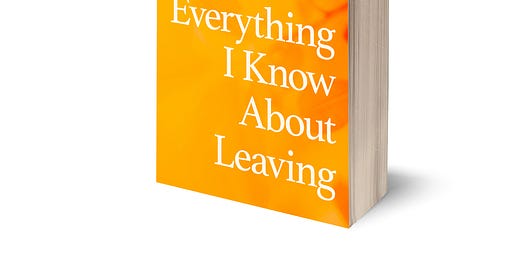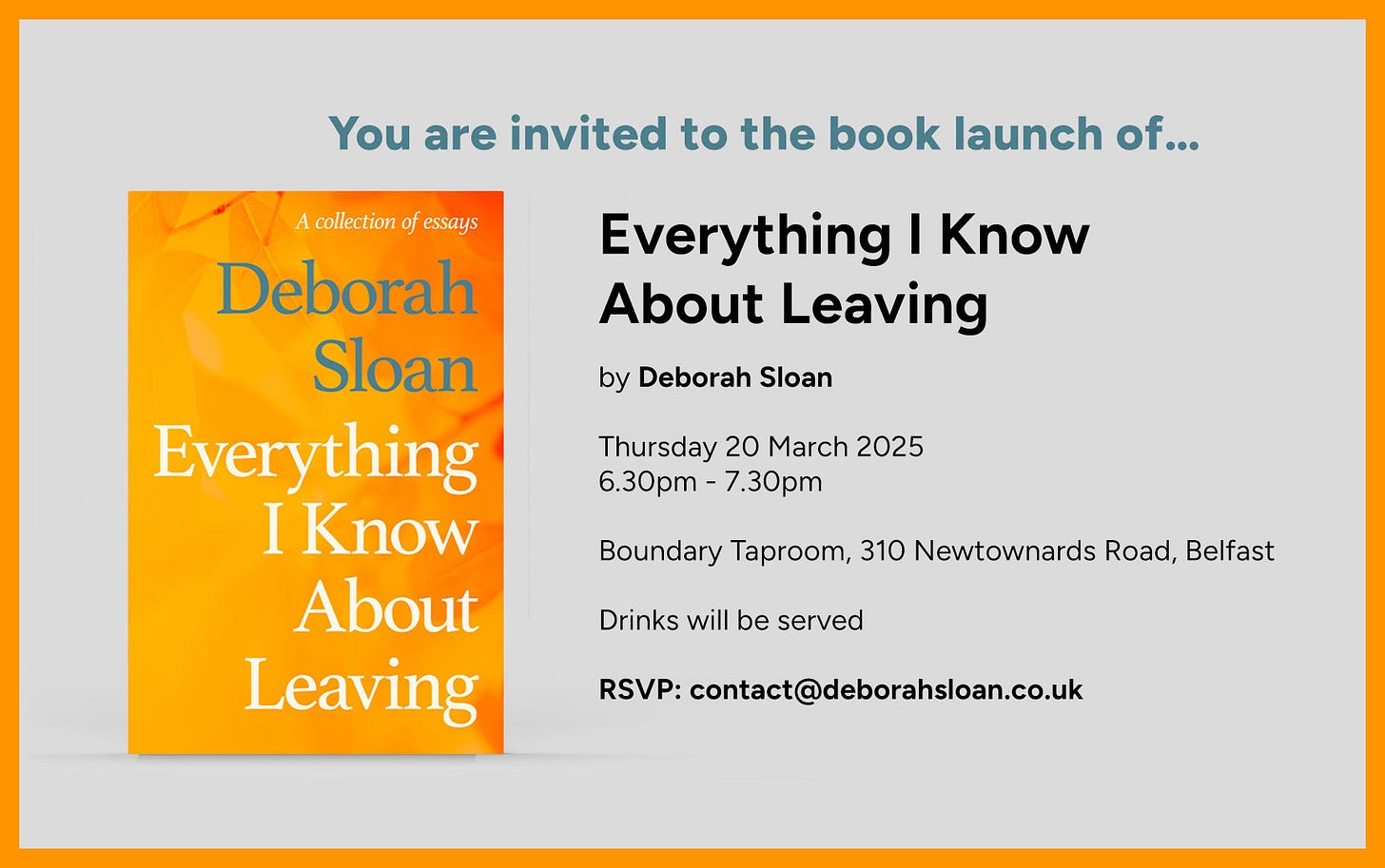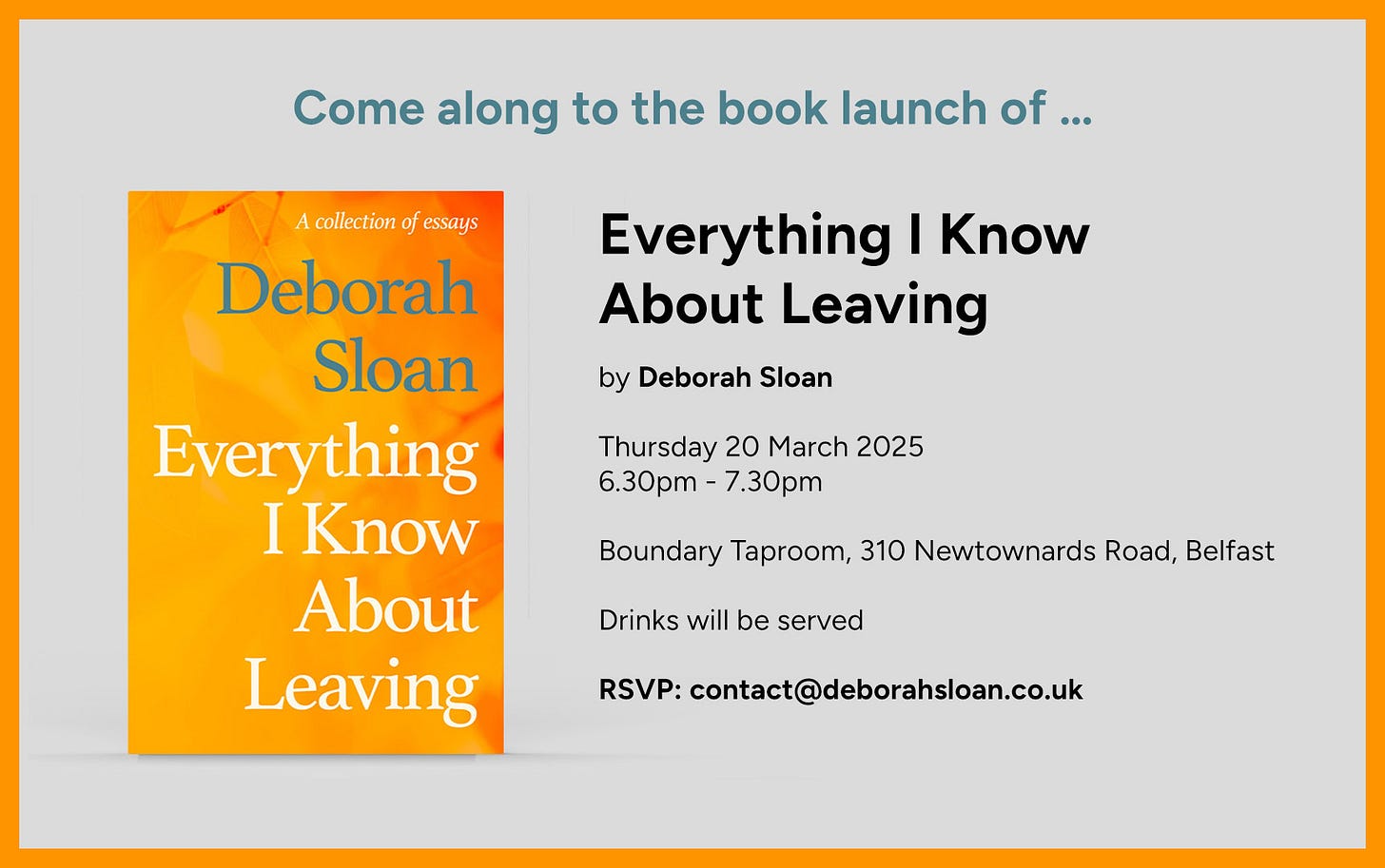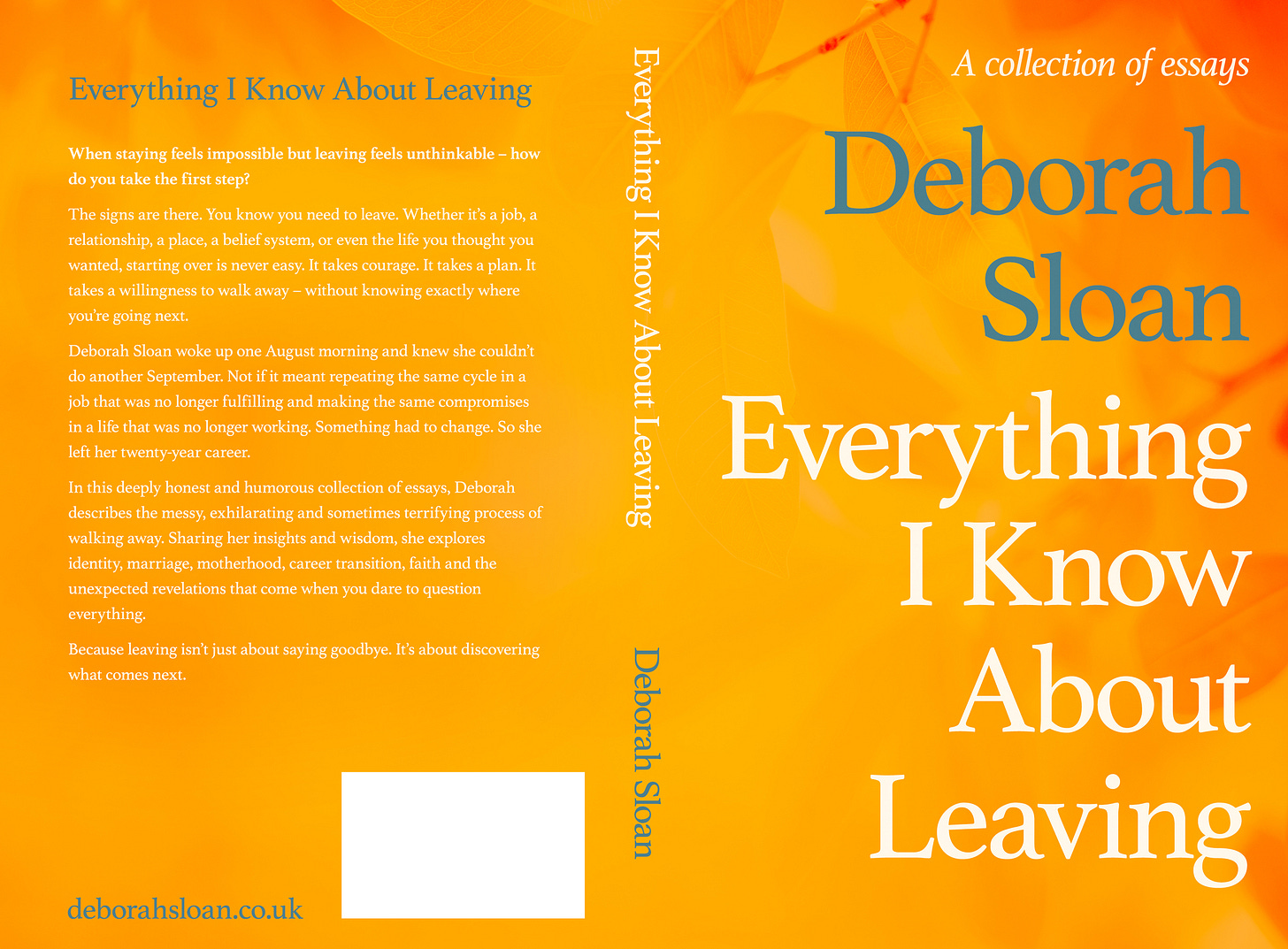“Leaving what?” asks my dad again after I tell him again that my book launch is on 20 March, and I make a mental note to text my mum the details so it can be added to the kitchen calendar because like a tree falling in the forest when no one is around to hear it, nothing can officially happen in their schedule until it is in block capitals and on the fridge. “I’m not sure you’ll enjoy it,” I say to her. “The seating is quite uncomfortable. It will be busy and noisy, and it’s kind of in a bar”. And I don’t think she knows what a taproom is, but I do know she won’t be able to hear anything in it, and besides, I’m not really that keen on her reading my collection of essays because it’s sort of the adult equivalent of snooping in my teenage diary. “I wouldn’t want to miss it,” she says, “but it will depend on how my knee is”.
This is your first invite.
On Monday, my book called ‘Everything I Know About Leaving’ which is not fiction and not a memoir and not self-help went to print, and I felt like I was standing on the shoreline waving one of my babies off on a round-the-world trip. It seemed so final, so letting go, so vulnerable.
“This is a moment,” I typed to the publisher who didn’t reply, not even with a heart emoji, because she’s had thousands of these moments and babies before. I reckoned I was possibly over-doing it a bit, the all-day nausea, the sudden wide-awake at 3am ruminating over misplaced commas, the getting-a-quote for authors’ insurance in case I’d be sued for sharing my perspective, the irrational (or are they?) fears about the massive spelling mistake that everyone will stand around and point at. “Can you check that the footnotes haven’t moved?” I said to my husband before I signed the bit of paper which would dispatch my words to a printing press and turn them into forever pages. I decided I was most proud of the acknowledgements I’d cobbled together on p191 but also sure I’d forgotten someone.
This week, I have expended much energy, promoting this launch. I am my version of plastered all over social media. I have been extending invitations via WhatsApp, Instagram, Outlook. I have trawled my phone and my inbox and my Christmas card list to find people I may or may not have communicated with in the last twelve months. I am realising how much a personal invite matters and what fun it is to reconnect because I now have catch-up lunches and coffees to look forward to with friends who thought I had fallen off the face of the earth.
I am hoping this humble jpg serves as your personal invite, all of you who loyally read my Friday writing. Please come if you can, especially if we live in the same country, although feel free to look into flights, and as I have told the others, don’t be getting all hung up on the RSVP. Just drop in if you happen to have an empty hour and no better plans. I’m not that stressed about numbers. It’s in a bar, after all. There will be no shortage of liquid.
This is your second invite.
“I’m looking forward to your speech,” said someone but for humility purposes, I’ll not be doing one. I’ll answer a few brief questions about what exactly I’ve been leaving for my dad’s benefit and maybe select my favourite excerpt to orate in my best voice. Then I’ll remind everyone about the pile of paperbacks I don’t want to take home with me.
But if I did do a speech, I’d probably say that had I not left, I’d have been lesser.
Had I not left, I’d have failed.
Had I not left, my soul would never have forgiven me.
Had I not left, this book would never have existed.
And I’d list them, eight things I have learned about leaving.
1. Most of how we view ourselves comes from our childhood. This is our conditioning, what we believe about who we need to be in order to be accepted. It subconsciously controls our behaviours. It shows up in our attitudes. Jojo Moyes says that once you hit middle age, you have to have a reckoning with yourself. If you don’t, you’ll “careen off into your later years, probably doing a lot of damage to everybody around you”1. We have to leave our childhood conditioning if we are to survive successfully. As Richard Rohr, who features heavily in my book and who sadly won’t be at the launch, says, we have to ‘discharge our loyal soldier’. It provides direction, boundaries, a conservative worldview and a respect for traditions but it isn’t equipped to carry us into the second half of life. It doesn’t have the imagination to take us to the higher and deeper places we need to go.
2. Ditto, our image. Much of our self-esteem comes not only from what is reflected back to us by the mirror, but also from what is reflected back to us, by others. For girls, this starts before we hit double figures when someone admires our face, compliments our figure, congratulates us on how well we look in whatever outfit we are wearing. We can be geniuses, virtuosos, goddesses yet we can regularly be floored by a zip that refuses to budge. This is the most difficult thing to leave, this idea that our value is attached to our appearance.
3. And to conditioning and image, I also add shame. In his most recent novel, Heart, Be at Peace, Donal Ryan describes how one night, two men come into Bridie’s house. They are wearing masks. They have a knife and a hammer. They hit her. They put a hand over her mouth. They tie her up. They take her cash and her jewellery and her pin number and her dead son’s black Casio watch. “I don’t know why I never told anyone,” she says. “The shame, maybe...”. Somehow, we must abandon this childhood-inherited notion that we are responsible for everything that happens to us.
4. And on to bigger things. There is no sacred/secular divide. The sacred is not in the building, in the rituals, in the religiosity, in the denomination. It is to be found everywhere, that is, if you choose to go looking for it. “Every time a pastor begins a sentence with the phrase ‘the culture,’ he should interrupt himself and lie down and take a nap,” says David Brooks2 who isn’t coming to the launch either.
5. Postscript to this - the source of much of the crisis of meaning (in my humble opinion) is spiritual disconnection.
6. A point will come when we may need to leave an institution, an organisation, a church, a system of rules and norms that has constrained us. And during the deinstitutionalisation process, we will learn that we are no longer accepted by those we left behind. Their support has been withdrawn. They avoid us in Sainsburys. They don’t like our LinkedIn posts. The exact reasons are unknown. It could simply be because we have rejected their customs and ways of life. We have left the tribe. Coming to terms with this rejection can be hard.
7. “The more you focus on using time well, the more each day begins to feel like something you have to get through, en route to some calmer, better, more fulfilling point in the future, which never actually arrives,” says Oliver Burkeman3. To live well, we have to redefine our relationship with time, seeing it not as a commodity, but as a privilege. We have to commit to wasting it in ways we enjoy.
8. Too many people distil their identities down to the roles they perform, a job, a title, an affiliation. Each of us should do ourselves a favour and check regularly if we would remain intact should these suddenly be stripped away from us….
‘Everything I Know About Leaving’ is available on 20 March. If you can’t get to the launch, there will be information on how to order soon!
The Second Mountain
Four Thousand Weeks








Excited to write the date in my diary. Thank you for your kind, generous invitation. This is such a meaningful post. I'm mulling over this bit especially, mourning the loss of a friend this week:
“The more you focus on using time well, the more each day begins to feel like something you have to get through, en route to some calmer, better, more fulfilling point in the future, which never actually arrives,” says Oliver Burkeman³. To live well, we have to redefine our relationship with time, seeing it not as a commodity, but as a privilege. We have to commit to wasting it in ways we enjoy."
Loved this post. Admire you greatly for pushing through and achieving your aim. Looking forward to meeting you!